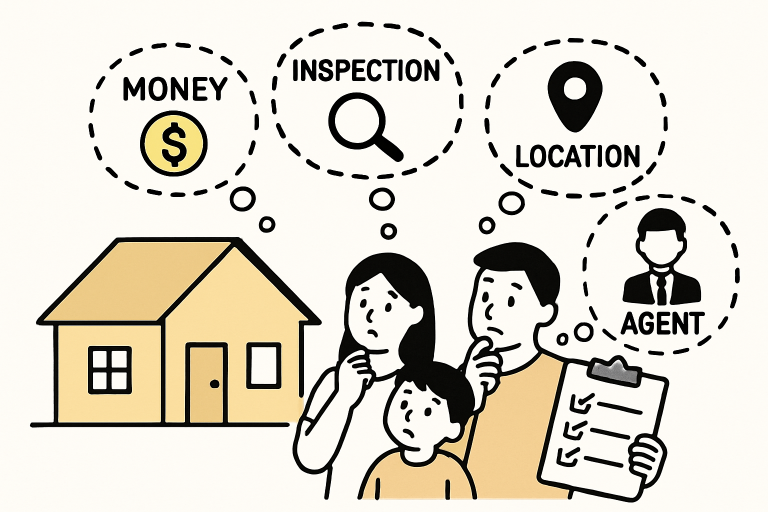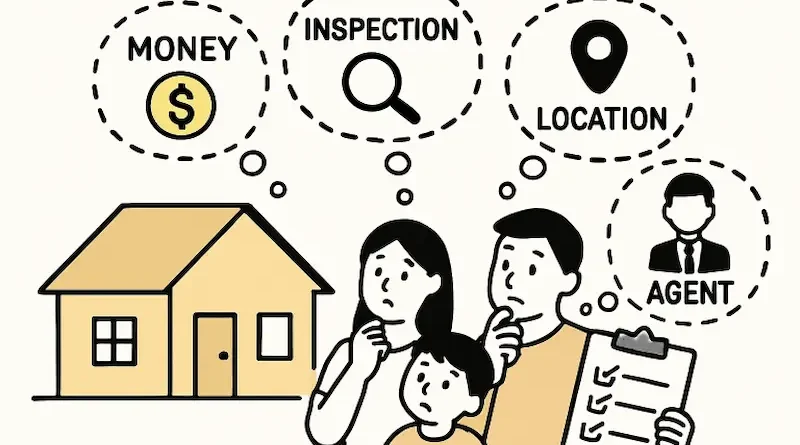Smart Moves: What Buyers Should Know Before Purchasing a Home
This guide is designed for both experienced and first-time homeowners to make informed decisions in today’s market. It emphasizes the importance of being vigilant about finances, conducting thorough research on the neighborhood, and staying up-to-date with real estate trends. Key steps include knowing your financial situation, getting pre-approved for a mortgage, prioritizing location, school ratings, and future neighborhood growth, never skipping on a professional inspection, monitoring local housing market conditions, seeking guidance from a skilled real estate agent, considering long-term lifestyle and resale potential, and budgeting for hidden costs beyond the purchase price. By following these steps, you can ensure your investment pays off and provides security for years to come.
Assess Your Financial Readiness
Before setting your heart on any property, take a hard look at your finances. This means more than just looking at your bank account—add up your debts, monthly spending, and ongoing obligations. Consider the impact of the down payment, mortgage principal, insurance, property taxes, and ongoing maintenance. Exploring options like Wellington FL homes for sale can give you a clearer picture of what’s available within your budget and help you align your financial goals with your housing expectations. Many financial experts recommend keeping monthly housing costs below 30% of your gross monthly income to ensure manageable living expenses and a robust emergency fund. Taking this approach minimizes stress and builds a solid foundation for your financial future.
Secure Mortgage Pre-Approval
Mortgage pre-approval is not simply a formality—it’s your ticket to certainty and leverage in a competitive market. While pre-qualification is a general estimate, pre-approval involves a thorough review by a lender of your income, assets, and credit history. By getting pre-approved, you not only cement your home shopping budget, but you also signal to sellers that you are committed and able to close promptly. Obtaining pre-approval can significantly increase your bargaining power in today’s fast-paced market.
Choose the Right Location
Purchasing a home isn’t just about the house itself—location will have a lasting impact on your day-to-day quality of life and future property value. Take time to evaluate neighborhoods based on crime statistics, school performance, public transport, and planned developments. Spend time in each area at different times of the day to get a feel for the community’s character and activity. A desirable location may even warrant fixing up an older home rather than settling for something new in a less appealing area.
Conduct a Comprehensive Home Inspection
A home may appear flawless on the surface, but hidden problems can lurk beneath. Professional inspectors check for major issues, including structural integrity, HVAC performance, plumbing, electric systems, and evidence of mold or pest infestations. Armed with your inspection report, you can negotiate needed repairs with the seller or walk away from a deal that would cost more than you can afford to fix. Remember AARP’s important reminder: “Don’t assume the model home you tour is what your home is going to look like — or cost”.
Understand Market Conditions
Market timing and trends have a tangible effect on price, speed, and negotiation. In a seller’s market, listings move fast, and offers can escalate above the asking price. In a buyer’s market, there’s more opportunity for negotiation and finding hidden bargains. Stay up to date by tracking local property listings, monitoring price patterns, and discussing shifts with your agent. Being aware of the climate can help you time your offer to seize the best deal.

Collaborate with a Knowledgeable Real Estate Agent
An experienced real estate agent acts as your advocate throughout the process. The best agents have a finger on the pulse of the local market, are expert negotiators, and can help sidestep common pitfalls. Look for someone with proven experience in your target neighborhoods and who communicates clearly and frequently. Don’t be shy about interviewing two or three agents before making your choice; this relationship will be crucial to your experience and outcome.
Plan for the Long Term
Think beyond your immediate needs. Will this home support your future—whether that’s a growing family, remote work, or eventual retirement? Consider your commute, number of bedrooms, yard size, and potential for adaptation or expansion. Even if this is your “starter” home, try to select a property that others would want to buy when you’re ready to move on, ensuring you won’t feel trapped if circumstances change.
Be Prepared for Additional Costs
The purchase price is only part of the equation. Expect to pay for closing costs, moving, utilities setup, insurance, new furnishings—and don’t forget those unanticipated repairs. A smart rule of thumb is to reserve 3% to 5% of your home’s value for such expenses, forming a buffer that prevents small problems from escalating into financial crises.
By approaching each step with diligence and research, you’ll ensure your home buying process is smooth, rewarding, and well-matched to your goals—today and in the years ahead.
Final Thoughts
Buying a home is one of life’s most significant financial and emotional investments—and preparation makes all the difference. From evaluating your financial readiness to collaborating with an experienced agent, every step builds the foundation for a confident and informed decision. Take time to understand both your short-term needs and long-term goals, balancing practical considerations like budget and location with lifestyle aspirations. Remember that patience and research often pay off more than rushing into the first appealing option. By following these strategies, you’ll not only find a property that fits your budget and priorities but also create a lasting sense of stability, comfort, and fulfillment in your new home.

